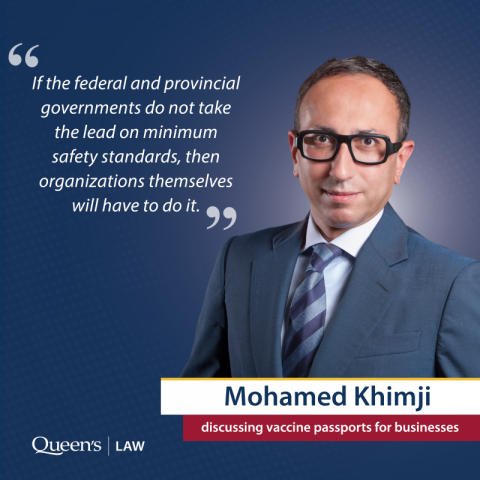
With Canada entering COVID-19’s fourth wave, Queen’s Law scholars and alumni lawyers share their insights on legal aspects of growing national and international concern. In this first of a three-part series, Professor Mohamed Khimji is interviewed for his perspective on such issues as vaccine passports for businesses and other organizations.
The pressure continues to build. Seventeen months into a global pandemic that has been the most soul-crushing and devastatingly costly of any human disaster in living memory, the sense of urgency to further reopen the economy and return to some semblance of normalcy grows by the day.
Mohamed Khimji, the David Allgood Professor in Business Law, has been watching closely, seeing that for many people and businesses, these imperatives have become life-or-death matters. At the same time, he’s wary of the haste at which the process is unfolding.
As a lawyer, consumer, and family man with two young children – one three and the other a one-year-old “pandemic baby” – Khimji has reservations about some measures proposed to ensure that, when the COVID virus and its killer variants are finally under control, they don’t come roaring back with a vengeance.
The faith that so many people have in the usefulness of vaccine passports as safeguards against this happening is something he wonders about. “We may be getting a bit ahead of ourselves,” he says. “There are two key issues that we need clarity on before we can move ahead: how long immunity lasts once a person is vaccinated (and public discussions have already begun about the need for booster injections) and the extent to which being vaccinated means a person no longer carries and transmits the virus.” As Khimji sees it, those essential bits of knowledge must be the reliable cornerstones of any initiatives going forward.
“Look at the motivations and the incentives that drive businesses and consumers. Businesses have been operating under fluctuating pandemic-related restrictions for a long time and they, along with their employees, are hurting. Consumers are hungry to get out, go places, do things, and spend money. There’s a huge pent-up demand out there.”
That said, there’s also a big problem. Faced with the lack of co-ordinated federal-provincial political leadership and transparency on vaccine matters, businesses and other organizations are filling the void by opting to develop their own protocols. As Khimji sees it, given pandemic uncertainties, that’s not a good thing.
“Generally, it’s much better to let organizations be free to try doing things their own way, see what works and what doesn’t, and go from there,” he says, “but under these circumstances with the stakes being so high, we really need government regulations setting minimum standards for safety informed by science.”
Not surprisingly, given the growing demand from businesses and consumers for so-called vaccine passports, Khimji would like to see the government step in to provide leadership. After all, the advantages and disadvantages of requiring such public health documentation are well known; they have been widely debated.
“If the state doesn’t take the lead on minimum safety standards, then organizations themselves will have to do it,” he says. “We’re already seeing companies that sell tickets to concerts and sporting events moving in the direction of requiring proof of vaccination. The airline and cruiseline industries are, too. Queen’s University itself recently mandated vaccination for every member of our community to return to campus this fall.” It’s a no-brainer that liability limitations will have to be further enhanced by all these organizations and will take on added importance as a litigation shield. “This is to be expected,” Khimji says, “and that might be fine, but only if all stakeholders are as fully informed as possible about the risks they’re subjecting themselves to. That will be key.”
Another trend that emerged during the third wave and grabbed his attention was the push for people to stay home and buy local. When lockdowns were at their peaks, public health officials in some counties outside Kingston ordered local restaurants, hotels, and shops to turn away customers from outside the region. Given the limited availability of health care in rural areas, Khimji applauds their prudence.
“The countries in the world that have been most successful at limiting COVID outbreaks tend to have implemented some region-to-region travel restrictions,” he says. “Until we have near-universal vaccination, people staying close to home and supporting local businesses strikes me as a very good idea.”
By Ken Cuthbertson, Law’83